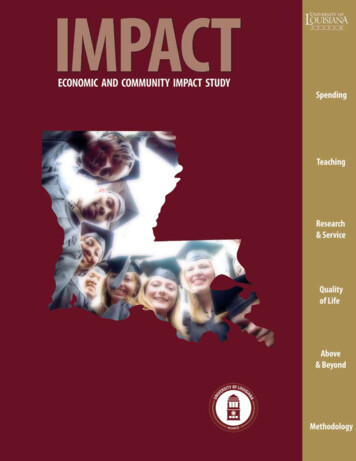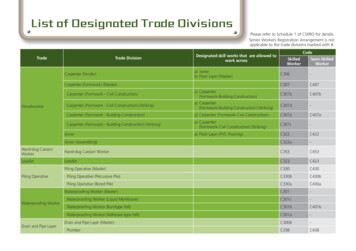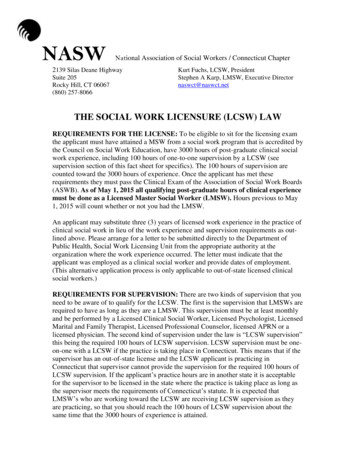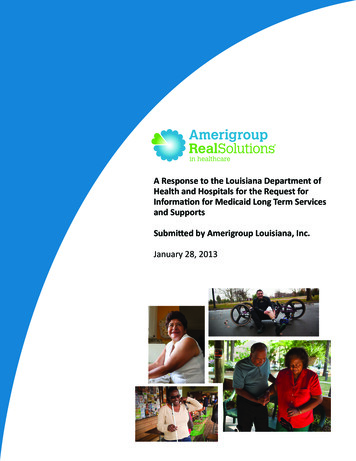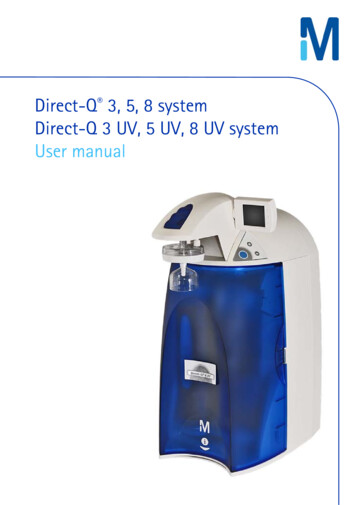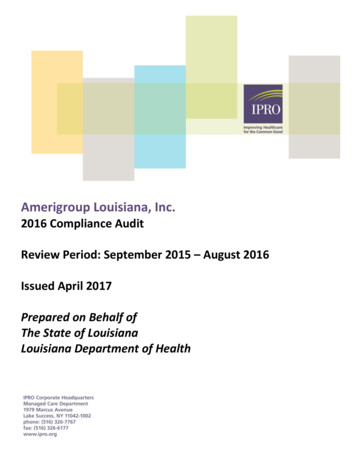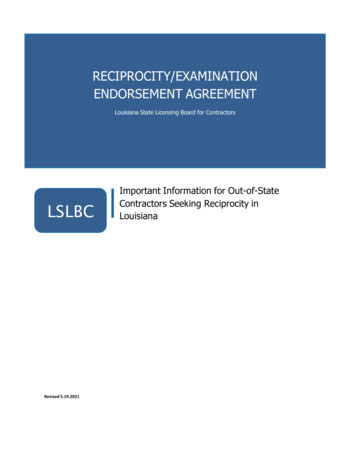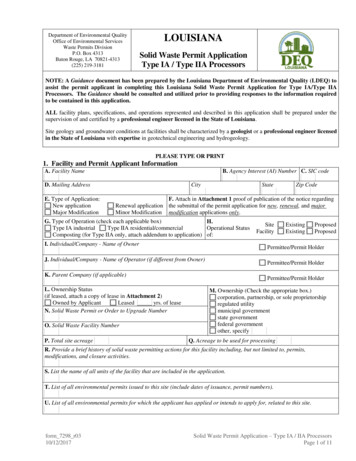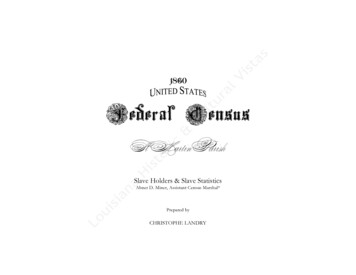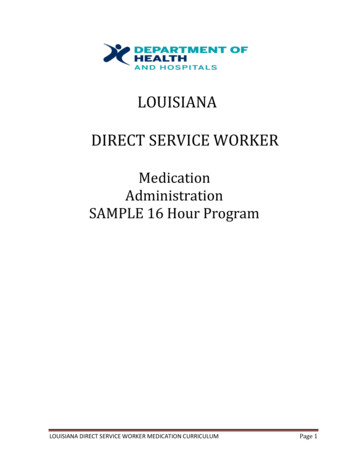
Transcription
LOUISIANADIRECT SERVICE WORKERMedicationAdministrationSAMPLE 16 Hour ProgramLOUISIANA DIRECT SERVICE WORKER MEDICATION CURRICULUMPage 1
ACKNOWLEDGEMENTSThe Medication Administration Core Curriculum was developed for use inLouisiana’s Home and Community Based Services (HCBS) programs and SelfDirection Programs.The core curriculum is the outcome of a collaborative effort between theDepartment of Health and Hospitals, Health Standards Section (HSS), Office ofAging and Adult Services (OAAS), and Office for Citizens with DevelopmentalDisabilities (OCDD), and the Louisiana State Board of Nursing (LSBN). The goal ofthis collaboration was to produce a competency-based, core curriculum thatprovides non-licensed staff with the basic knowledge, skill and guidance needed toensure safe and effective medication administration and performance ofnoncomplex tasks.This training curriculum is not all inclusive and should in no way substitute for therequired, person-specific training and competency evaluation performed by theRegistered Nurse (RN).Bailey’s LawThis medication administration curriculum was developed by the Office for Citizenswith Developmental Disabilities (OCDD), Office of Aging and Adult Services(OAAS) and the Health Standards Section in conjunction with the Louisiana StateBoard of Nursing as directed by House Bill 185 (ACT 507) of the 2014 LegislativeSession. The legislation also known as Bailey’s Law was initiated by Mr. JasonDurham whose daughter Bailey Caroline Durham was a recipient of waiverservices through the Department’s Self-Direction Program. It recognizes theadvocacy efforts on behalf of persons with disabilities to have the right to directtheir own care and services. All direct service workers who provide supports andservices to waiver clients in the Self-Direction Program and administermedications as part of the client’s plan of care, must receive this training.Rule: LAC 48:Chapter 92.R.S. 37:1031-1034 and R.S. 40:2179-2179.2 Chapter 92 Subchapter D.Medication Administration and Noncomplex Tasks in Home and Community BasedSettings:LOUISIANA DIRECT SERVICE WORKER MEDICATION CURRICULUMPage 2
Medication Administration for Direct Service WorkersTABLE OF CONTENTSCover Page1Acknowledgements2Introduction to Course: Training Process4Medication Administration and Noncomplex Tasks in Home and Community BasedSettings: Rule: LAC 48:Chapter 92.R.S. 37:1031-1034 and R.S. 40:2179-2179.2 Chapter 92 Subchapter D.R.S. 37:1031(A) and 1033(A) (Bailey’s Law)Medication Administration Training: Course OverviewModule 1: Legal aspects, Policies and ProcedureModule 2: Infection Control MeasuresModule 3: Classification of Medications & Terminology;Module 4: Medication Preparation, Administration, Storage &Six Rights of Medication AdministrationModule 5: Vital SignsModule 6: Documentation5692339576999Competency Tests follow each module.Appendix ARN Competency Assessment of the DSW to Perform Medication Administrationand/or Noncomplex Task(s) Sample Form.Appendix B108111Test Answer Keys117Certificate of CompletionLOUISIANA DIRECT SERVICE WORKER MEDICATION CURRICULUMPage 3
IntroductionThe Louisiana Department of Health and Hospitals (DHH) is committed to assuringthat individuals receiving Home and Community-Based Services (HCBS) receivesafe, quality care. The Louisiana DHH recognizes the roles of both licensed nursingand trained, unlicensed personnel in the provision of care, including theadministration of medication and performance of approved noncomplex tasks toHCBS Waiver participants. In recognition of these roles, the DHH shall insure thatguidelines for a system of competency based training for unlicensed personnel aredeveloped and implemented in accordance with in all applicable rules andregulations. These guidelines are designed to foster and enhance a uniform andconsistent means of safe medication administration and the performance ofapproved noncomplex tasks by unlicensed d Direct Service Workers (DSW’s)working in a HCBS Waiver and Self Direction settings.Scope:This training curriculum shall apply to unlicensed DSW personnel in the HCBSWaiver setting who administer medications and who perform approved,noncomplex procedures in HCBS Waiver programs.The training is intended to encompass the components of the direct serviceregistry rule published in the Louisiana Register, vol. 38 #12 December 20, 2012,Section 9245In certain circumstances however it may be necessary for additional, supplementaltraining to be performed. This will be dependent on the waiver participant’s specificcondition and needs which may require approved noncomplex tasks not included inthe basic medication administration course. The RN will determine if additionaltraining is appropriate.Course Participant Minimal Requirements:Minimal requirements to successfully complete this training program include: DSW must be a least 18 years of age; DSW must have the ability to read, write and carry out directionscompetently as assigned and; DSW must have no finding on the registry that he/she has abused orneglected an individual being supported or misappropriate the individual’sproperty or funds.Goals of the Instruction Program:1. Introduce the learners to concepts related to administering medications andthe performance of approved noncomplex tasksLOUISIANA DIRECT SERVICE WORKER MEDICATION CURRICULUMPage 4
2. Provide learners with experiences in administering approved medications.3. Provide consistency of basic medication administration and performance ofapproved noncomplex tasks by unlicensed DSW personnel throughout thestate.Evaluation:The learner is required to pass the test following each training module with 80%accuracy. A certificate will be provided upon successful completion of the courseand must be kept in the DSW’s personnel file at the support coordination agency,the DSW may also have a copy of his/her certificate. This documentation must bereadily available for inspection by the DHH or its designee.Initial competency and subsequent annual competency evaluations will beperformed by the delegating RN with documentation of ongoing competency alsomaintained and available for inspection by DHH or its designee.Rule: Rule: LAC 48:Chapter 92.R.S. 37:1031-1034 and R.S. 40:2179-2179.2 Chapter 92 Subchapter D.Medication Administration and Noncomplex Tasks in Home and Community BasedSettings: Allows for the Person Specific Training of DSW’s by an RN who hasassessed the health status of the person and who has determined that the DSWcan competently perform the tasks in a safe, appropriate manner.R.S. 37:1031(A) and 1033(A) (Bailey’s Law)LOUISIANA DIRECT SERVICE WORKER MEDICATION CURRICULUMPage 5
Medication Administration Curriculum for Direct Service WorkersTraining Process Online Internet Based training-Explanation of training and testingprocess for Internet training will be according to agency policies andprocedures related to Self DirectionOn Line training is only available for Self Direction Program, thissample may be used in all HCBS programs. Modules Modules are consecutive Each module ends with test questions Staff must score 80% on each module before they may proceed to thenext module Skills demonstration – RN will evaluate or monitor skills, proficienciesand competency.Medication Administration Curriculum for Direct Service WorkersCourse Objectives: To train DSW (non-licensed personnel) in:Methods of delivering medication Safely and accurately administering medication to ensure the safety ofthose individuals in your care Understanding intended effects of medications, as well as, the potentialfor adverse side effects Recognizing and differentiating side effects Properly reporting adverse side effects Following instructions given in response to adverse side effects Demonstrating competencyCourse Goal:This course is intended for non-licensed personnel who provide direct care ofindividuals receiving supports or services in the HCBS Waiver and Self Directionprograms.LOUISIANA DIRECT SERVICE WORKER MEDICATION CURRICULUMPage 6
Upon successful completion of this course the non-licensed personnel wouldprove competency, as determined by a registered nurse, in administration of anindividual’s medication.COURSE DESCRIPTIONThis course is designed to include:online internet based:(if used for Self DirectionProgramCompetency SkillstestingRN oversightEach module will contain a post examination to determine competency inunderstanding the information. A passing score of 80% is required on Module I,II, III and IV exams.With successful completion of this course, non-licensed personnel will haveincreased knowledge of the following:1. Accurate transcription of medication from the order/prescription on to theappropriate Medication Administration Record2. Reviewing individuals history on Medication Administration Record (allergiesand other co-existing medical conditions)3. Using proper hygiene/universal precautions in medication preparation.4. Accurate individual/medication identification by comparing medication labelto the transcribed Medication Administration Record:a.Right Clientb.Right Medicationc.Right Timed.Right Dosee.Right Routef.Right Documentation5. Educating individual on medications being administeredLOUISIANA DIRECT SERVICE WORKER MEDICATION CURRICULUMPage 7
6. Application/Administration of:a.Oral Medicationsb.Eye Dropsc.Ear Dropsd.Topical Ointments/Creams7. Correct use of oral and nasal inhalers8. Observation of individuals during/after medication administration:a.For cheeked medicationb.How to observe and report adverse effects9. Taking vital signs as applicable:a.blood pressureb.temperaturec.respirationsd.and pulseLOUISIANA DIRECT SERVICE WORKER MEDICATION CURRICULUMPage 8
MODULE 1:Legal Issues, Policies andProceduresLOUISIANA DIRECT SERVICE WORKER MEDICATION CURRICULUMPage 9
To the Non-Licensed PersonnelAs a direct staff person working in the HCBS waiver program and Self DirectionPrograms, part of your duties may require that you assist with medicationadministration. It will be your responsibility to create an environment in whichmedications can be given safely. It will also be your responsibility to observe thepeople you support and report your observations to help determine if medicationsare working. This training will help you learn to administer/assist withmedications in a safe, error-free manner.Medications are given to treat or prevent health problems. Many of themedications taken by people you support are given to eliminate or decreasesymptoms of a disease or behavior rather than to cure it. The goal of medicationis to improve quality of life.It is important to follow standard steps when administering medications. Youmust also remember to create a home- like environment for the people yousupport. In addition to following standard steps, you must get to know thepeople you support. This will allow you to recognize changes in their physicalcondition or behavior. It is recommended that you learn about their personality,physical conditions, current medications, and capabilities. Some of the peopleyou support may not be able to communicate with you verbally. This will requireyou to communicate in ways that they recognize and understand.LOUISIANA DIRECT SERVICE WORKER MEDICATION CURRICULUMPage 10
Liability Issues Related To Medication AdministrationOnly physicians, dentists and advanced registered nurse practitioners may "prescribe”medication. Physicians, dentist and pharmacists, are licensed to “dispense” medications.Nurses are licensed to “administer” medications and may delegate the task to administeroral and topical medications to persons who have completed a course such as this.While there are similarities in the registered nurse (RN) practice and the licensedpractical nurse (LPN) practice, the degree of educational preparation and theresponsibilities of each differ.In order to be eligible for either license, the candidate must have completed the requiredamount of education from either an RN or LPN accredited program. Once the accreditedprogram has been successfully completed, the candidate is eligible to sit for the NationalCouncil Licensure Examination (NCLEX).After successfully passing that first exam, ongoing education is required to ensurecompetency. Each nurse is required to complete approved continuing education eachyear, or provide documentation of the State Board approved alternative.Registered nurses may work directly under the direction of physicians, dentists andadvance practice nurses, while licensed practical nurses must also work under thedirection of a registered nurse.These and other laws are in place to govern the practice of nurses in the state ofLouisiana, to ensure the health and welfare of those served. The law that pertains tonon-licensed persons working under the authority of a licensed nurse.This regulation explicitly spells out how tasks may be delegated to a non-licensedindividual by a licensed nurse. In keeping with this regulation, it will be the responsibilityof the Provider agency to ensure a registered nurse trains this course, and evaluates thecompetency of the individuals who have completed the course.A registered nurse will also be responsible for ongoing training and competencyevaluations of the non-licensed persons to safeguard the health and welfare of theindividuals in care. This is a safe and prudent practice on behalf of the employingagency, as well as, the nurse. Each Provider agency must have policies in place toidentify how and when this will take place.Upon completion of this training, the non-licensed personnel will receive a certificate ofcompletion which will be kept with the support coordination agency and available forinspection by the DHH or its designee.LOUISIANA DIRECT SERVICE WORKER MEDICATION CURRICULUMPage 11
Role of Non-Licensed Personnel in Medication Administration:Where delegation is required the non-licensed personnel will perform medication administration asa delegated function under nursing supervision in accordance with LAC 48:Chapter 92. R.S.37:1031-1034 and R.S. 40:2179-2179.2Chapter 92 Subchapter D.The following cannot be delegated:o conversion or calculation of medication dosageo assessment of an individual's need for or response to medicationo nursing judgment regarding the administration of PRN (medications given asordered) medicationsNon-licensed personnel will be permitted to follow a specific physician protocol for PRNmedication and document effectiveness or ineffectiveness of the medication.Example: if the physician wrote an order for Tylenol 350 mg for fever 100.0 F and thenon-licensed personnel administered Tylenol for a fever of 101.0 then documented adecrease in the temperature or no decrease in temperature. The non- licensed staff issimply collecting information and documenting, not using nursing or medical judgmentabout an action or intervention.The non-licensed personnel shall not perform a task that involves an individual who is not in astable condition.The non-licensed personnel should never accept a delegation that he/she knows is beyondhis/her skill set or knowledge. Non-licensed personnel have the right and are encouraged toask for assistance and/or additional training.The non-licensed personnel has the responsibility to ALWAYS follow procedures of the selfdirection program and to report to the nurse if they have any reason to believe they have madea medication error. This should be reported as soon as possible.The non-licensed personnel has the responsibility to ALWAYS report the following: signs or symptoms that appear life-threatening events that appear health threatening medication that produces no results or undesiredresultsOther Legal Considerations in Medication AdministrationA. Packaging of medications:Pharmacies have the responsibility of dispensing medications in a way that will ensure anindividual's safety. Medications prescribed for individuals are often packaged in what arecalled unit doses (one dose of medication in each area of package).The original manufacturer’s label on over the counter medication has to be maintained toensure legibility for accurate administration.It is illegal to transfer ANY medication from one container to another container Thisincludes both controlled and non-controlled substances.LOUISIANA DIRECT SERVICE WORKER MEDICATION CURRICULUMPage 12
B. Storage of medications:ALL medications will be kept locked in accordance with agency policies andprocedures following Drug Enforcement Agency (DEA) requirements.Medications requiring refrigeration will be kept in a refrigerator. Medications must be stored inaccordance with manufacturer’s recommendations.Medication ErrorsA medication error occurs when one of the “six client rights” has been violated. Examples ofthese would be: Administering wrong medication Administering wrong dose of medication Administering medication at the wrong time (Medications may be administered peragency policy prior to or past the time ordered, and still be considered to be on time). Administering the medication in the wrong route (i.e. dermatological ointmentadministered to eye) Administering medication to wrong individual Failing to document medication was given or inaccurate documentation ofmedicine givenMedication errors may result in adverse reactions to the individual. These reactions couldrange from a rash to death.Always Check the Rights of Medication When removing the medication from storage When removing the medication from its container When returning the medication to storageSix Rightsa.b.c.d.e.f.Right PersonRight MedicationRight TimeRight DoseRight RouteRight DocumentationLOUISIANA DIRECT SERVICE WORKER MEDICATION CURRICULUMPage 13
Refusal of MedicationsIt is an individual’s right to refuse medications. Individuals should understand, to the best oftheir ability, the symptoms that medications are prescribed for and any common side effects.Non-licensed staff should explain that these medications are considered a part of theirindividualized treatment plan. Remember that each person may communicate in different waysand staff must be trained on how to communicate with each person they support.Refusing medications is NOT considered a medication error, and should be documented on theMedication Administration Record as a “refusal of medication”. This documentation ensuresthe individual has been offered the medication as ordered, and also proves staff competency inmanagement/administration of medications. DSW must notify family and supportcoordination agency as soon as possible after the occurrence.Missed MedicationsClients will occasionally miss a dose of medication. This may cause a problem because missing adose may make the medicine less effective, but taking subsequent doses too close togetherincreases the risk of side effects. Reasons clients may miss a medication dose may include: Has forgotten to take or to be given the medication Has missed the correct time for a dose because they were at an appointment or away fromhome longer than expected Was asleep at the time the medication was due.A missed medication does not include a client who refused to take their medication or has vomitedtheir medication.If a medication is missed, the DSW must document this on the medication administration record(MAR) by initialing and circling their initials. There should be documentation regarding why themedication was missed. The DSW should seek follow up instructions from the RN in the event amedication is missed.Preventing and Reporting Medication ErrorsKnowing the following before administering medications will help prevent medicationerrors: Name (generic and trade) Purpose Effect Length of time to take effect Side effects Adverse effectsLOUISIANA DIRECT SERVICE WORKER MEDICATION CURRICULUMPage 14
Interactions Special instructions Where to get help Six rights of medicationThere is a printable handout located on the handout page at the end of this module titledPreventing and Reporting Medication Errors.Errors occur when staff Do not follow the doctor’s orders exactly Do not follow manufacturer’s directions Do not follow accepted standards for medication administration Do not observe the "six rights" of medication administrationWhen an error occurs DSW must contact the family and the support coordination agency immediately.Handouts attached: RN vs. LPN Sample MAR Preventing and Reporting Medication Errors What is a Medication ErrorLOUISIANA DIRECT SERVICE WORKER MEDICATION CURRICULUMPage 15
Registered Nuurse and Licensed Practicall Nurse:WhatWhat’s the Difference?SimilaritiesBooth the Registered Nurse and thee LicensedPrractical Nurse Must complete education requirementnts from anaccredited programMust pass the National License ExamMust have ongoing education to ensureurecompetence and complete the requireded number ofContinuing Education Credits each yeararDifferencesThe Registered Nurse:rse: Must complete a higher degreeee of educational preparationHas greater responsibilitiesWorks directly under the direection of physicians, dentists,or advance practice nurses Must complete a lesser degreeee of education preparationHas a lesser degree of responnsibilitiesWorks both independently of and performs acts prescribedby physician, dentists or advaance nurse practice nurse ANDa Registered NurseThe License Practicaal Nurse:LOUISIANA DIRECT SERVICE WORKER MEDICATION CURRICULUMPage 16
Preventingg and Reporting Medication ErrorrrorsKnowing the following beffore administering medications will help preventprmedication errors: Name (generic andd trade) Purpose Effect Length of time to tatake effect Side effects Adverse effects Interactions Special instructionss Where to get helpErrors occur when staff: Do not follow the ddoctor’s orders exactly Do not follow manuufacturer’s directions Do not follow acceptpted standards for medication administrattionWhen an error occurs: Complete a medicaation error reportReportMedicationLOUISIANA DIRECT SERVICE WORKER MMEDICATION CURRICULUMPage 17
LOUISIANA DIRECT SERVICE WORKER MEDICATION CURRICULUMPage 18
LOUISIANA DIRECT SERVICE WORKER MEDICATION CURRICULUMPage 19
What is a Medication Error?A medication error occurs when one of the “six clientrights” has been violated. Administering wrong medication Administering wrong dose ofmedicationMedication errors mayresult in adversereactions to theindividual. Thesereactions could rangefrom a rash to death.Administering medication at thewrong timeMedications may be administered per agency policy prior orper agency policy past the time ordered, and still beconsidered to be on time.Administering the medication in the wrong route (i.e.dermatological ointment administered to eye) Administering medication to wrong individual Failing to document medication was given or inaccuratedocumentation of medicine givenRefusal of Medications:It is a person’s right to refuse medications. Individuals shouldunderstand thesymptoms that medications are prescribed for, and alsoshould be made aware of any common side effects. He/sheshould also be able to verbalize understanding that thesemedications are considered a part of treatment and that theLicensed Practitioner will be notified should he/she refuse themedicationRefusing medications is NOT considered a medication error.End of Module 1LOUISIANA DIRECT SERVICE WORKER MEDICATION CURRICULUMPage 20
MEDICATION ADMINISTRATIONTEST - MODULE 1Legal Issues, Policies and ProceduresKEEP COMPLETED TEST ON FILEStaff: Test Date: Score:1. The Medication Administration Course for HCBS and Self Direction Programs is intended to betaken by:A.BC.D.2.As a direct staff person (non-licensed person) working in the HCBS and Self DirectionPrograms, part of your responsibilities is that you may be required to assist with medicationadministrationA.B.3.Home and Community Based ServicesHealth Care Basic ServicesHome Care Best SystemNone of the AboveAs a direct staff person (non-licensed person) part of your responsibility when working will beto:A.B.C.D.5.TrueFalseHCBS stands for:A.B.C.D.4.non-licensed personnel who provide direct care to individuals receiving supports inthe HCBS Waiver and Self Direction programsRegistered NurseLicensed Practical NurseIndividual receiving HCBS Waiver servicesCreate an environment in which medications can be given safelyObserve the people you support and report your observations to determine ifmedications are working.Follow standard steps when administering medicationsAll of the aboveAs a direct staff person (non-licensed person) you may only administer those medications thatthe Registered Nurse can legally delegate you to administerA.B.TrueFalseLOUISIANA DIRECT SERVICE WORKER MEDICATION CURRICULUMPage 21
6.Medications that the Registered Nurse CANNOT delegate you to administer and areconsidered Complex tasks include:A.B.C.D.7.It is illegal to transfer ANY medication from one container to another containerA.B.8.TrueFalseWhich of the following lists the “SIX RIGHTS of medication administration”A.B.C.D.10.TrueFalseMedication errors occur when one the “SIX RIGHT of medication administration” has beenviolated:A.B.9.IM medications: medications given by injection in the muscleSC medications: medications given by injection in the subcutaneous tissueIV medications: medications given by injection in the veinsAll of the aboveRight Person; Right Medication, Right Time, Right Dose, Right Route, Right DocumentationRight Day, Right Month, Right Person, Right House, Right Order, Right PhysicianRight Person, Right Parent, Right Home, Right Date, Right Reactions, Right ChartNone of the aboveMedication errors occur when one the “SIX RIGHTS of medication administration” has beenviolated: Which of the following can result in a medication error?A.B.C.D.Administering wrong medication, Administering wrong dose of medicationAdministering medication at the wrong time, Administering medication in the wrongroute (i.e. skin ointment administered to eye)Administering medication to the wrong individual, Failing to document medication wasgiven or inaccurate documentation of medicine givenAll of the aboveLOUISIANA DIRECT SERVICE WORKER MEDICATION CURRICULUMPage 22
MODULE 2:INFECTIONCONTROL MEASURESLOUISIANA DIRECT SERVICE WORKER MEDICATION CURRICULUMPage 23
LOUISIANA DIRECT SERVICE WORKER MEDICATION CURRICULUMPage 24
LOUISIANA DIRECT SERVICE WORKER MEDICATION CURRICULUMPage 25
LOUISIANA DIRECT SERVICE WORKER MEDICATION CURRICULUMPage 26
LOUISIANA DIRECT SERVICE WORKER MEDICATION CURRICULUMPage 27
LOUISIANA DIRECT SERVICE WORKER MEDICATION CURRICULUMPage 28
LOUISIANA DIRECT SERVICE WORKER MEDICATION CURRICULUMPage 29
LOUISIANA DIRECT SERVICE WORKER MEDICATION CURRICULUMPage 30
LOUISIANA DIRECT SERVICE WORKER MEDICATION CURRICULUMPage 31
LOUISIANA DIRECT SERVICE WORKER MEDICATION CURRICULUMPage 32
LOUISIANA DIRECT SERVICE WORKER MEDICATION CURRICULUMPage 33
LOUISIANA DIRECT SERVICE WORKER MEDICATION CURRICULUMPage 34
LOUISIANA DIRECT SERVICE WORKER MEDICATION CURRICULUMPage 35
End of Module 2LOUISIANA DIRECT SERVICE WORKER MEDICATION CURRICULUMPage 36
MEDICATION ADMINISTRATIONTEST - MODULE 2INFECTION CONTROL MEASURESKEEP COMPLETED TEST ON FILEStaff: Test Date: Score:2. Infection control is defined as a set of methods used to control and prevent the spread of disease:A.B.2.The best ways to prevent the spread of disease is:A.B.C.D.3.DWhen touching surfaces that may be contaminatedRight before contact with mucous membranes or broken skinImmediately if they become wet, worn, soiled or tornAll of the aboveContaminated means: dirty, soiled, uncleanA.B.6.When you come in contact with bloodWhen you come in contact with body fluids; secretions and excretionsWhen you come in contact with broken or open skin, human tissue or mucousmembranesAll of the aboveWhen should you change gloves?A.B.C.D.5.Good hand washingUsing alcohol-based hand cleaner in place of washing when soap and water not availableAvoid touching your eyes, nose or mouthAll of the aboveWhen must you wear gloves?A.B.C.4.TrueFalseTrueFalseDisinfection means: cleaning so germs (pathogens) are destroyedA. TrueB. False7.Mucous membranes are: membranes that line body cavities that open to the outside of the bodyLOUISIANA DIRECT SERVICE WORKER MEDICATION CURRICULUMPage 37
A.B.8.Which of the following are MODES of transmission (the way germs are passed from one person toanother)A.BC.D.9.Body fluids – tears, saliva, sputum (mucus coughed up), urine, feces, semen, vaginalsecretions, pus or other wound drainage, bloodTouching the infected person or their secretions – Droplets, coughing, sneezing,laughing , spitting, talkingTouching something contaminated by the infected personAll of the aboveUniversal Precautions:A.B.C.D.10.TrueFalseInfection control guidelines designed to protect workers from exposure todisease spread by blood and certain body fluidsState you must always treat blood, body fluids, broken skin and mucousmembranes as if they were infectedAre to be followed because you cannot tell by looking at a person whether theyhave a contagious diseaseAll of the aboveCommon methods you can do to help prevent spread of diseaseA.B.C.D.E.Cover your nose and mouth with a tissue every time you cough or sneezeThrow used tissue in a wastebasketIf you do not have a tissue, sneeze or cough into your sleeveAlways clean your hands after coughing or sneezingAll of the aboveLOUISIANA DIRECT SERVICE WORKER MEDICATION CURRICULUMPage 38
MODULE 3:Classification of Medications &TerminologyLOUISIANA DIRECT SERVICE WORKER MEDICATION CURRICULUMPage 39
Prescribed MedicationsPrescribed medications are those medications that a licensed practitioner (physician,dentist, and advanced registered nurse practitioner) has ordered for trea
advocacy efforts on behalf of persons with disabilities to have the right to direct their own care and services. All direct service workers who provide supports and services to waiver clients in the Self-Direction Program and administer medications as part of the client’s plan of care, must receive
